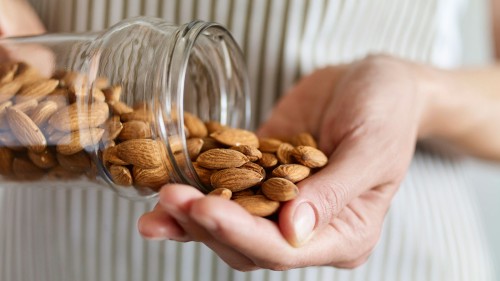11 Evidence-Based Ways to Boost Metabolism
Published on January 14, 2022
Medically Reviewed by Ana Reisdorf, MS, RD
Are you wondering how to speed up your metabolism? A faster metabolism may make it easier to lose weight and keep it off. Fortunately, there are several backed-by-research ways to boost metabolism naturally.


Metabolism is the rate at which your body burns calories for energy. Some aspects of our metabolism are determined by our genes, while the rest can be modified by our habits.
An increase in metabolism means that your body burns more calories with everything it does, including when it’s doing absolutely nothing. Those with a higher metabolism also tend to have more energy.
One simple way of measuring your metabolism is through your BMR, or basal metabolic rate.
Your BMR is the number of calories your body uses to maintain vital functions. The higher this number is, the more calories you burn on a given day. (1)
Your BMR can be measured using a simple formula, or your fitness trackers can do this for you based on the data you enter.
How do you increase your BMR and improve your metabolism? If you’re trying to lose weight and improve your energy, here are the 11 best ways to boost metabolism.
1. Eat More Protein
Protein is essential for a fast metabolism for several reasons. This is because when you consume high-protein foods, your body burns 20%–30% more calories on average than from eating fat and carbs.
This increased calorie burn is known as the thermic effect of food (TEF), and a higher TEF helps raise metabolism. (2)
Including more protein in the diet also helps maintain lean muscle mass and increase your BMR. The more lean muscle you have, the faster your metabolic rate is.
Protein is also super filling, so having protein with every meal helps curb cravings. If you don’t feel full or satisfied after meals, or you’re finding yourself constantly hungry, you may not be getting enough protein in your diet. (3)
Put It Into Action
Include metabolism-boosting lean protein sources such as skinless chicken breast, fish, turkey, tofu, eggs, Greek yogurt, cottage cheese, beans, lentils, nuts, and seeds.
For best results, it’s recommended to eat at least 20–30 grams of protein per meal, depending on the person.
Eating a more even amount of protein at each meal and snack versus having too much all at once will enable your body to use it most efficiently.
2. Do More HIIT Exercises
HIIT workouts, or high-intensity interval training workouts, can improve metabolism by challenging your body.
HIIT workouts involve switching between intervals close to maximum heart rate and then down to fat-burning mode.
Engaging in these intervals is highly effective in burning fat, especially belly fat, and in supporting a fast metabolism. (4)
The best part is that spending 20 minutes doing a HIIT session can actually burn more calories than a longer cardio session at a steady pace. (5)
This is great news for those pressed for time, as you can get an effective workout done in a shorter period of time.
Put It Into Action
To boost metabolism, incorporate at least 20 minutes of HIIT exercises into your weekly workout routine, 2–3 times per week. This can simply mean kicking your cardio workouts up a notch or downloading a HIIT-focused workout app for ideas.
3. Eat Spicy Foods
Eating more spicy foods may also speed metabolism.
Some studies have shown that a specific compound found in cayenne pepper called capsaicin can boost metabolism and increase your daily calorie burn. (6)
However, based on the amount most people can realistically eat, this effect is likely modest at best.
This doesn’t mean that it’s not worth having, but it’s unlikely that eating hot pepper alone will boost your metabolism enough to lead to any significant weight loss.
Put It Into Action
If you’re a hot pepper lover, you can continue eating it regularly mixed in with sauces, stir-fries, or as hot sauce added to your eggs.
4. Drink Coffee
Coffee lovers rejoice! Coffee is another natural metabolism booster.
Studies have shown that caffeine in coffee can accelerate fat burning, speed up your metabolism, and help you lose and maintain weight. (7)
These metabolism benefits seem to be most probable with up to 4 cups of caffeinated coffee per day, which is the upper limit set forth by the FDA. (8)
Put It Into Action
Drinking 1–4 cups of caffeinated coffee per day may support a faster metabolism. To reap the biggest benefits, opt for caffeinated coffee, and limit added cream and sugar to keep calories in check.
5. Drink Green Tea
If you prefer tea over coffee, you’re in luck. Green tea has also been shown to raise metabolism. (9)
It is thought green tea may do this by increasing your body’s fat-burning potential, and by converting stored fat into energy.
Green tea is abundant in a compound called epigallocatechin-3-gallate (EGCG), which is a powerful antioxidant. It is thought that EGCG is responsible for the weight loss and metabolism-boosting effects of green tea.
It’s also possible that the caffeine present in green tea helps further increase metabolic rate.
Put It Into Action
Enjoy 2–3 cups of green tea a day to increase metabolism. Limit added cream, sugar, or honey to prevent excess calories and negate the health benefits of green tea.
6. Drink Plenty of Water
Drinking water has many benefits, but it can also kickstart your metabolism.
Water is calorie-free, and drinking it also helps to replace other potentially higher-calorie, higher-sugar beverages like juice or soda.
Studies have also shown that drinking water specifically can provide a temporary speed in metabolism for up to an hour. (10)
Water also helps fill you up and drinking it before your meals may help you eat less.
Put It Into Action
Aim to drink at least eight 8-ounce cups of water a day to raise your metabolism. Drinking cold water, in particular, may provide an added boost, as it requires your body to work harder to bring the water up to room temperature. (11)
7. Move Around More
When it comes to exercise, it’s not just scheduled exercise that assists in improving your metabolism and burning calories — daily movement counts too.
Research has specifically shown that increasing your non-exercise activity thermogenesis (NEAT) can also increase your metabolic rate and burn calories. (12)
Essentially, anything that involves moving counts as NEAT activity, so it’s easier to fit in than you think.
Standing instead of sitting while working, increasing your daily step count, or taking the stairs all count towards your daily calorie burn.
Put It Into Action
Get in more movement throughout the day, such as getting up to do stretches, squats, or jumping jacks to get your heart rate up.
If you have a fitness tracker, a good goal to aim for is 10,000 steps each day. Continue increasing your daily step or calorie goal every few weeks to continuously challenge yourself.
8. Get Enough Sleep
Sleep deprivation is all too common and can negatively affect our metabolism and weight.
If your sleep habits have changed or you’re lacking sleep, this can slow your metabolism down.
Poor sleep also affects the levels of several hormones involved in metabolism and appetite, such as cortisol, ghrelin, and leptin. When these hormones become out of whack, they can lead to powerful food cravings that are difficult to ignore. (13)
Improving your sleep quality is one habit that can help you build metabolism. This is often easier said than done, but sticking to a schedule helps.
Put It Into Action
Aim for 7–8 hours of sleep per night whenever possible.
To get more quality sleep, create a relaxing bedtime routine for yourself. This may mean shutting off all electronic devices within 30 minutes of bedtime, journaling, taking a warm bath, or listening to relaxing music.
9. Do More Resistance Training
When it comes to burning calories, cardio is often the first thing that comes to mind. However, resistance training is just as important, if not more important, to get your metabolism going.
Examples of resistance training include bodyweight exercises, weight lifting, and the use of weight machines.
Even though you may not burn as many calories during a resistance training session as during cardio, your body actually continues to burn calories during the hours after your resistance training workout.
In fact, one study showed that metabolism remains elevated for up to 38 hours after resistance training, which is not seen with cardio. (14)
Resistance training also helps to build lean muscle, which is more metabolically active than fat. This basically enables you to burn more calories at rest, which increases your basal metabolic rate (BMR). (15)
Put It Into Action
Incorporate resistance exercises into your weekly workout routine at least 2–3 times per week. Vary the muscle groups you use to prevent overuse, such as doing upper body exercises one day and lower body the next.
As you get comfortable with a particular exercise or weight amount, slowly increase the number of reps or the amount of weight every month.
This will help keep you challenged and prevent your body from getting too comfortable with what you’re doing, because when your body gets too comfortable, it doesn’t have to work as hard or burn as many calories to do the work.
10. Manage Your Stress
Stress can have a significant impact on your metabolism. I’ve seen this all too often with my weight-loss clients who are super stressed, where they are doing all the right things, but they can’t seem to lose weight.
When you’re stressed, your body produces more of a hormone called cortisol. This is known as the stress hormone. (16)
If you’re experiencing chronic stress and your cortisol levels remain elevated, it can slow your metabolism down and cause your body to go into a “fight-or-flight” response.
Stress can also indirectly wreak havoc on your metabolism by affecting your sleep quality.
Put It Into Action
You can’t remove all the stress in life, but you can control how to manage it.
Start by incorporating daily stress-relieving techniques such as deep breathing, meditation, yoga, or journaling to keep stress levels at bay.
Just 10 minutes a day is enough to experience the stress-reducing benefits.
If needed, there are even natural supplements to help reduce stress levels. If you’re curious about supplements, speak to your doctor to see what’s best for you.
11. Eat Enough Calories
Have you ever followed a very low-calorie diet to lose weight, only to later find out it was a waste of time?
Fewer calories are not always better when it comes to metabolism and weight loss. Believe it or not, eating too little can actually slow down your metabolism. (17)
If you’re being too strict or eating less than 1,200 calories a day, your body thinks you’re starving and will try to conserve energy.
Most active people need at least 1,500 calories a day, if not more. Thus, eating regular meals containing adequate calories can help support a healthy metabolism.
Put It Into Action
Make sure you are consuming enough calories to support a healthy metabolism. You can get a good estimate of your daily calorie requirements using a calorie calculator or by calculating your BMR.
Eat at least three meals a day and snacks if you’re hungry. Don’t skip meals or ignore your hunger, as this will only make your body think you’re starving.
The Bottom Line
It is possible to raise your metabolism by integrating key diet and lifestyle habits into your daily life.
Some of these habits range from eating regular balanced meals, engaging in both HIIT exercises and resistance training, to managing stress and sleep.
While all of these tactics help, it’s important to remember that increasing your metabolism takes time, and it’s likely a combination of several habits that will bring the biggest metabolism-boosting benefits.
If you’re concerned with your weight or suspect your metabolism is slow, speak to your medical doctor. They can check for any possible medical causes and help you establish healthy habits to support a faster metabolism.
At WellnessVerge, we only use reputable sources, including peer-reviewed medical journals and well-respected academic institutions.
- Does basal metabolic rate predict weight gain?:
https://academic.oup.com/ajcn/article/104/4/959/4557125 - Diet induced thermogenesis:
https://www.ncbi.nlm.nih.gov/pmc/articles/PMC524030/ - Protein, weight management, and satiety:
https://academic.oup.com/ajcn/article/87/5/1558S/4650426 - High-Intensity Intermittent Exercise and Fat Loss:
https://www.ncbi.nlm.nih.gov/pmc/articles/PMC2991639/ - Caloric expenditure of aerobic, resistance, or combined high-intensity interval training using a hydraulic resistance system in healthy men:
https://pubmed.ncbi.nlm.nih.gov/25162652/ - Dietary capsaicin and its anti-obesity potency: from mechanism to clinical implications:
https://www.ncbi.nlm.nih.gov/pmc/articles/PMC5426284/ - Caffeine intake is related to successful weight loss maintenance:
https://pubmed.ncbi.nlm.nih.gov/26554757/ - FDA: Spilling the Beans: How Much Caffeine is Too Much?:
https://www.fda.gov/consumers/consumer-updates/spilling-beans-how-much-caffeine-too-much - Green tea extract ingestion, fat oxidation, and glucose tolerance in healthy humans:
https://pubmed.ncbi.nlm.nih.gov/18326618/ - Effect of 'water induced thermogenesis' on body weight, body mass index and body composition of overweight subjects:
https://pubmed.ncbi.nlm.nih.gov/24179891/ - Water-induced thermogenesis reconsidered: the effects of osmolality and water temperature on energy expenditure after drinking:
https://pubmed.ncbi.nlm.nih.gov/16822824/ - The Role of Non-exercise Activity Thermogenesis in Human Obesity:
https://www.ncbi.nlm.nih.gov/books/NBK279077/ - Short Sleep Duration Is Associated with Reduced Leptin, Elevated Ghrelin, and Increased Body Mass Index:
https://www.ncbi.nlm.nih.gov/pmc/articles/PMC535701/ - Effect of an acute period of resistance exercise on excess post-exercise oxygen consumption: implications for body mass management:
https://link.springer.com/article/10.1007%2Fs00421-001-0568-y?LI=true - Contributing factors and variability of energy expenditure in non-obese, obese, and post-obese adolescents:
https://pubmed.ncbi.nlm.nih.gov/15952420/ - Effect of increase in cortisol level due to stress in healthy young individuals on dynamic and static balance scores:
https://www.ncbi.nlm.nih.gov/pmc/articles/PMC6371989/ - Persistent metabolic adaptation 6 years after "The Biggest Loser" competition:
https://pubmed.ncbi.nlm.nih.gov/27136388/






